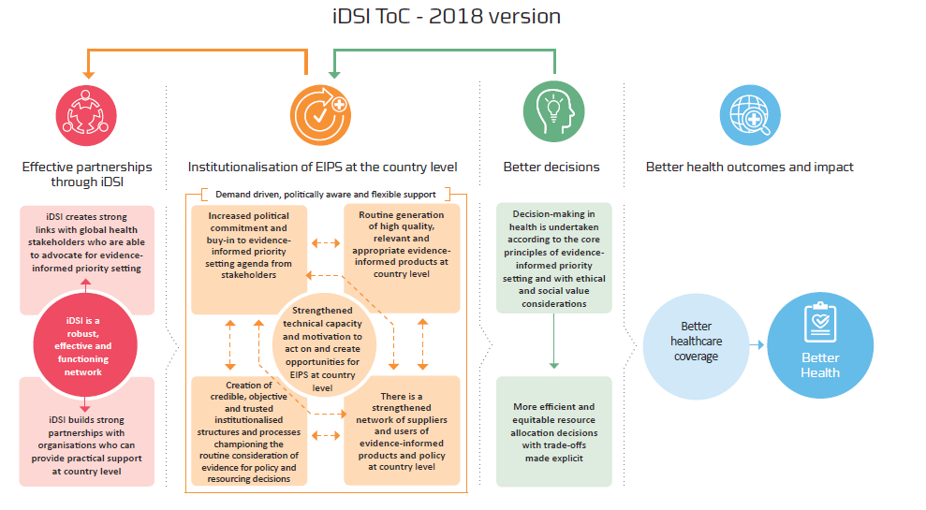Monitoring, Evaluation, and Learning (MEL)
The iDSI Theory of Change
The iDSI Theory of Change outlines the key causal steps and preconditions for translating iDSI support into the institutionalisation and capacity-strengthening required for “better decisions”, and underpins our monitoring, evaluation and learning (MEL) framework – how we measure and judge the success of our work – but also critically shapes how we strategically plan our activities, how we communicate our impact, and how we learn as a network.
The iDSI Theory of Change is now in its second version following a recent literature review on the effectiveness of different approaches that have been attempted in institutionalising evidence-informed priority-setting, and is the product of our longstanding collaboration with Itad, our independent monitoring and evaluation partner. It also reflects the many discussions, applications and refinements involving iDSI’s wider network of global and in-country partners.
To our knowledge, iDSI was one of the first global priority-setting support initiatives to have developed and implemented a Theory of Change and we are pleased to see similar ideas being adopted by other initiatives. We are continuing to work with the Gates Foundation and other global development partners to ensure a coherent, strategic ad evidence-based approach to delivering health systems strengthening support to countries on their journey towards UHC.

Institutionalisation of evidence-informed priority-setting: iDSI country learning reviews
We believe that sustainable impact is only possible when there is local ownership, local leadership, and local capacity to prioritise and adopt the interventions and technologies that generate the most health for the money. The best way to achieve this is by being demand-driven, context-specific, and building lasting relationships with in-country partners.
iDSI’s mid-term learning review in 2016, conducted independently by Itad and involving triangulated stakeholder interviews in India and Indonesia, provided both encouraging endorsement of our approach and important lessons to support the growth of the network.
Since then, India and Indonesia have already demonstrated astonishing progress, rapid progress in HTA institutional development. In 2018 Itad completed updated learning reviews of our work in China, Indonesia, South Africa and Ghana around the “institutionalisation of evidence-informed priority-setting” pillar of the revised iDSI Theory of Change, and a similar review is also underway in India to be completed in 2019.
“
iDSI’s approach to technical assistance at country level is an important feature of its niche, and its ability to align its support to country-led demand is a distinguishing quality worth safeguarding… iDSI partners are viewed as credible, experienced, respectful and, most importantly, worthwhile engaging with in support of country goals.iDSI mid-term learning review Itad
iDSI’s MEL framework and tools, mid-term learning review, our 2016 and 2018 country learning reviews, and related resources can be downloaded from the Measuring Impact channel of the iDSI Knowledge Gateway.